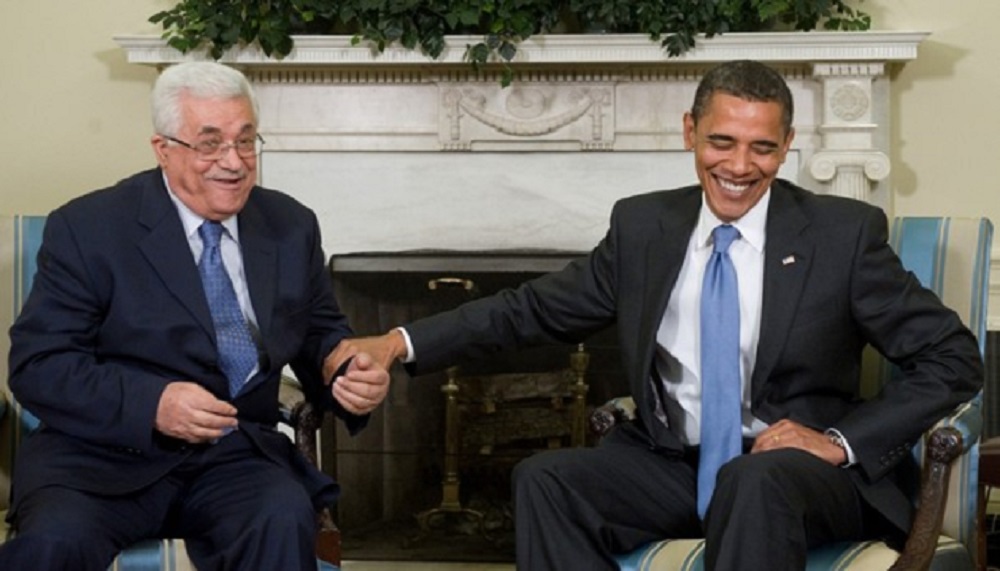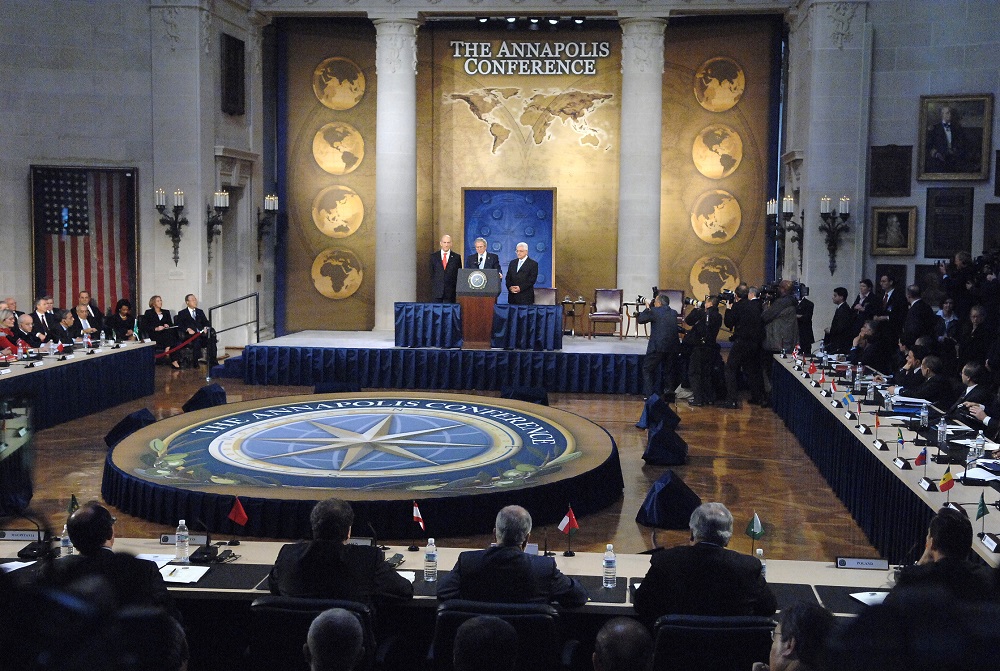The Palestinians: Why Negotiate? The U.S. Will Extract Concessions For You
When Jackson Diehl of the Washington Post attacks Obama’s outrage over the Jerusalem District Planning and Building Committee’s decision to approve the construction of 1,600 housing units in Ramat Shlomo (a post-1967 Jerusalem neighborhood) as “ideological – and vindictive,” you know that Obama has made a serious political blunder. And Hillary Clinton’s 43-minute lecture to Prime Minister Netanyahu only added to it.
The Israeli Prime Minister was also exposed to diplomatic isolation – a taste of which he encountered during his recent humiliation at the White House and State Department – meetings held in virtual secrecy without a single photo op, ceremony or press conference. It is inconceivable that Obama would have treated any Arab or Muslim leader or even third world tyrants with the same considered contempt that he has shown to Netanyahu. These events are all the more astonishing in that they are happening at a time when the Jewish State is gaining favor with the American people who see Israel as America’s staunchest supporter of democracy and opponent of terrorism in the Middle East.
The administration has apparently decided to provoke a diplomatic crisis with Israel over a construction project that was plainly in keeping with past U.S.-Israeli undertakings concerning east Jerusalem. Israel’s official position for the last forty years has been that east Jerusalem’s status is an issue for permanent status negotiations with the Palestinians in the future. This policy, however distasteful it may be to the Obama administration, did not prevent the conclusion of peace agreements with Egypt and Jordan, nor did it preclude the Palestinians from negotiating with Israel for more than fifteen years after the Oslo Accords of 1993. Now, suddenly, instead of being a mere blip, these construction plans have become a cause celebre, and, we are told, an impediment to world peace. Apparently, a zoning dispute in Israel’s capital city is more important than addressing the nuclear threat posed by Iran.
The dispute has affected American credibility with Israel, our European and Asian allies, as well as the Arab world. Today, the only element uniting Palestinian, Israeli, and Arab leaders is their common distrust of American leadership in the region. As Robert Kagan notes in the Washington Post: “The president has shown seemingly limitless patience with the Russians as they stall an arms-control deal that could have been done in December. He accepted a year of Iranian insults and refusal to negotiate before hesitantly moving toward sanctions. The administration continues to woo Syria without much sign of reciprocation in Damascus. Yet Obama angrily orders a near-rupture of relations with Israel for a minor infraction like the recent settlement dispute — and after the Israeli prime minister publicly apologized.”
For some unfathomable reason, the Obama administration sees Israel as obstructionist, defiant and intransigent. It does not yet understand that the Israeli-Palestinian conflict is not territorial but existential. It is oblivious to the risks Israel has taken in withdrawing from Gaza, the continuous indoctrination and incitement taking place in Palestinian society (as documented by Palestinian Media Watch and MEMRI) through its mosques, media, schools, music videos, children’s media, government sponsored events, the missile attacks on Israel’s civilian population centers, and the enormous concessions – rejected by Mahmoud Abbas – that the governments of Barak (2000) and Olmert (2008) were prepared to make on both Jerusalem and the West Bank, not to mention Israel’s continuing efforts to negotiate a durable and lasting peace. These events are rarely if ever mentioned by this administration.
Evidently, since Obama cannot not coerce Israel to acquiesce to his demands through quiet pressure, he has decided to bring such pressure into the public sphere by insisting upon demands to which no Israeli government can acquiesce – demands that include giving the U.S. a veto over any Israeli military strike against Iran’s nuclear installations. That’s because the administration has accepted a nuclear-armed Iran in the unrealistic belief that the threat it would pose to world stability can somehow be contained. Military action is now off the table which is all the more surprising given that the U.S. is aware that the Iranians are providing logistical support to al Qaeda in Afghanistan and Iraq yet it has elected to do nothing.
To enforce his demand, he has ordered an embargo on equipment needed in Israel’s Dimona nuclear reactor, and a similar embargo on the delivery of the Joint Direct Attack Munitions (JDAMs) – the super bunker-buster bombs that he had earlier promised to Israel. These munitions have since been diverted to the Indian Ocean island of Diego Garcia. Nor is this the first time he has interfered with Israel’s qualitative military and technological edge. A January 2010 Jewish Institute for National Security Affairs (JINSA) Report notes that “the White House has so far blocked key weapons projects and upgrades for Israel, rejecting requests for AH-64D Apache Longbow helicopters while approving advanced F-16 multi-role fighters for Egypt …. Israel’s request for the six AH-64D Apache Longbow attack helicopters was blocked by the Obama administration in June – the same time the Egyptian sale was approved.”
Obama continues to treat Israel like a vassal state by threatening to withhold a U.S. veto at the UN Security Council on any resolution unilaterally declaring of a Palestinian state or on Jerusalem despite the U.S. historically having vetoed more than 40 UN resolutions critical of Israel since 1972, at least three of which were explicit condemnations of Israeli construction activity in east Jerusalem; insisting that Israel transfer areas adjacent to Jerusalem (specifically Abu-Dis, where Palestinian government institutions were previously established) to exclusive PA control; and requiring Israel to …..
cease all Jewish construction in east Jerusalem,
release hundreds of convicted Palestinian terrorists from Israeli prisons “as a confidence building measure”,
establish a Palestinian state within the next two years (whether or not that involves resolving Israel’s strategic concerns including security guarantees, an end to any further Palestinian claims, a demilitarized state without foreign armies on its soil, resettlement of all Palestinian refugees in the new state of Palestine, and recognition of Israel as a Jewish state in response to recognition of Palestine as an Arab state),
renew peace talks with Syria (which continues to strengthen its bonds with Iran, arms Hezbollah in Lebanon with sophisticated weapons, facilitates the transfer of terrorists into Iraq, permits Hamas, Palestinian Islamic Jihad and other terrorist groups to maintain offices in Damascus, and pursues the development of chemical and biological weapons1,
agree to negotiate the partition of Jerusalem (despite Congressional recognition in 1990 that “Jerusalem is and should remain the capital of the State of Israel” and “remain an undivided city” open to people of all faiths, not to mention the passage of the Jerusalem Embassy Act in 1995 calling for the movement of the U.S. Embassy from Tel Aviv to Jerusalem),
withdraw from West Bank “settlements” (despite understandings that the large settlement blocs would remain in Israel proper in any negotiated final agreement), and,
agree to the “right of return” of millions of hostile foreign Arabs to pre-1948 Israel (a development that would make Jews a minority in their own land).In effect, he is demanding that Israel collaborate in its own destruction by engaging in a diplomatic process in which it would trade land for terror.
It would seem that Netanyahu’s acquiescence to a Palestinian state (hailed at the time as “unprecedented” by Secretary Clinton), a ten-month moratorium on Jewish construction in Judea and Samaria that specifically excluded Jerusalem (a fact this Administration now dismisses), and the dismantling of hundreds of checkpoints and roadblocks mean nothing to an administration whose long term strategy is to demonstrate to America’s enemies that the U.S. is prepared to impose a Czechoslovakian-style dictat on Israel to concede everything, while giving the Palestinians a pass on anything – including their dedication of tournaments, streets, marketplaces and a town square outside Ramallah to “martyrs” whose sole “accomplishments” have been slaughtering Israeli men, women and children. If it’s “very dangerous” to construct Jewish housing in a city that Israel will never, ever relinquish, what should we call the effort to brainwash children into believing that Israel itself doesn’t exist?
Nor has the White House demanded that the Palestinian Authority shut down Fatah’s deadly al-Aqsa Martyrs’ Brigades or end its boycott of Israeli-made goods from Judea and Samaria as it was required to do after the 1993 Oslo Accords. Obama even went to Cairo University in June 2009 to assure the Palestinians and the greater Arab world that he appreciated their plight without assuring Israelis that he appreciated theirs. He has spoken to Arabs, Muslims, Iranians, Western Europeans, Eastern Europeans, Russians, and Africans – but has not bothered to speak to Israelis. And in August 2009, there was no reaction from Obama to a Fatah conference that “reaffirmed Fatah’s refusal to accept Israel’s existence as a Jewish state, glorified terrorists living and dead by name, praised the ‘armed struggle,’ and in which Abbas himself declared ‘We maintain the right to launch an armed resistance.’”
Under such circumstances, why should the Palestinians agree to negotiate with Israel when they are content to watch a U.S. administration extract concessions significantly greater than any they could ever hope to achieve though bilateral talks? A couple of years ago the Israelis and Palestinians were negotiating directly about all the important issues. Since Obama began his “engagement” and ideological fixation on the “peace process”, the Palestinians haven’t even agreed to enter indirect “proximity” talks. Diehl’s editorial in the Washington Post lays the blame for the current crisis squarely on President Obama, whom it accuses of treating Netanyahu “as if he were an unsavory Third World dictator, needed for strategic reasons, but conspicuously held at arms’ length.” He notes: “Obama picked a fight over something that virtually all Israelis agree on, and before serious discussions have even begun….A new administration can be excused for making such a mistake in the treacherous and complex theater of Middle East diplomacy. That’s why Obama was given a pass by many when he made exactly the same mistake last year. The second time around, the president doesn’t look naive. He appears ideological – and vindictive.” And, according to Caroline Glick: “Obama has pocketed Netanyahu’s concessions and escalated his demands … With the U.S. President treating Israel like an enemy, the Palestinians have no reason to agree to sit down and negotiate.”
The fact is that neither George Mitchell nor Hillary Clinton nor Robert Gates, nor the president himself has obtained a single concession from the Palestinian Authority – not one. Since the Oslo Accords of 1993, seventeen years of efforts under three presidents and six prime ministers have led nowhere. That’s because, for the Palestinians, the conflict is not about 1967, but about 1948 – hence their uncompromising stance on the so-called “right of return”. The Oslo Accords (1993), Hebron Agreement (1997), Wye River Accords (1998) and Gaza Disengagement (2005), which gave the Palestinians large areas of Judea, Samaria and all of Gaza and placed nearly all Arab residents of these areas under Palestinian rule, provided the basis for self-government, and eventual statehood, but that was not enough to satisfy them. When the Arabs speak of “occupation”, they are referring to everything from the Jordan River to the Mediterranean Sea despite all their talk of a “two-state solution”. That’s why thousands of Palestinians are expected to participate in so-called Nakba rallies throughout Gaza, the West Bank and the Arab world next month. The Nakba, or “catastrophe,” is how the Arab world refers to Israel’s establishment on May 15, 1948.
This President has spent more time provoking our friends than he has challenging our enemies. His constant attempts to engage with Iran, Syria and Turkey combined with his delay in signing the Iran Refined Petroleum Sanctions Act suggest that he views developing U.S. relations with these anti-American regimes as his primary foreign policy goal. Given that each of these leaders has demanded that in exchange for better relations, Obama must abandon Israel as a U.S. ally, his recent behavior can be explained in strategic terms rather than as pique over new apartment buildings in Jerusalem.
As a result, the administration’s constant affirmations of its “rock solid” commitment to Israel’s security – from Obama in Washington, to Mitchell and Biden in Israel, to Clinton at the AIPAC Conference last month are no longer credible. The Obama administration has jeopardized not Israel’s stature, but America’s regional interests and international credibility. When Obama proclaimed to the U.N. General Assembly in September 2009 that “no one nation can or should try to dominate another nation,” the message to world leaders in the audience recalls Robin Williams’s 1970s nightclub impression of Jimmy Carter addressing the world on the eve of World War III: “That’s all, good night, you’re on your own.” It cannot be too comforting to our allies to know that if Israel can be sold out with such ease, what does this say about the U.S. and its steadfastness with its other allies? Our allies are baffled and angered by an America that seems to be behaving completely irrationally, and they see the U.S. as abdicating its leadership role in world affairs particularly as it relates to Iran. This is not just an America in decline. This is an America in retreat (by design and on principle) – accepting, ratifying and declaring its decline, and inviting rising powers like Iran, Turkey, Russia and Syria to fill the vacuum.
As Jennifer Rubin writes in Commentary: “For Obama, the highest foreign-policy priorities are getting along with the “international community,” accommodating our foes (i.e., “engagement”), and reorienting the U.S. toward the “Muslim World.” If those aims come in conflict with Israel’s security needs (which they inevitably do) and its efforts to hold back the assaults on the Jewish state’s legitimacy, Israel may well have to fend for itself”.
Obama is deluding himself. He continues to see Israel as a liability rather than as a strategic asset. He continues to look for simple solutions to complex problems. He continues to deal with the Middle East not as it is, but as he would like it to be. He refuses to identify the political ideology of our enemy in this war as violent Islamist extremism (as we witnessed in the wake of the Fort Hood murders, the failed Christmas Day bomber and the failed Times Square bomber), and he continues to believe that the political culture of the Middle East operates on the same principles as the political culture of the U.S. and Western Europe. Brett Stephens notes: “The Marxist-Leninist regimes of the Cold War era were never great believers in the virtues of martyrdom. That is not the case with Shiism, which has been decisively shaped by a cult of suffering and martyrdom dating to the seventh century. During its war with Iraq, Iran sent waves of child soldiers, some as young as 10, to clear out Iraqi minefields. Tens of thousands of children died this way…..To suggest that there is some universal standard of “pragmatism” or “rationality” where Iran and the rest of the world can find common ground is a basic intellectual error.”
Obama’s linkages and reasoning are all wrong. That’s why he shouldn’t be surprised that his diplomacy has made enemies of friends, but failed to make friends of enemies. As a former Secretary of State, Dean Acheson, warned a half-century ago: “No people in history have ever survived who thought they could protect their freedom by making themselves inoffensive to their enemies.”
The Arab Street will never support America because it is uninterested in seeing an end to the conflict. Any situation that includes recognition of Israel as a sovereign Jewish state with even partial control over the holy sites, and renunciation of the right of return would constitute capitulation. Beyond that, regardless of what Arab leaders might say in public for English-language consumption, the truth comes out in private conversation, and in Arabic-language speeches at home. Libyan leader Muammar al-Gaddafi said as much in a recent interview with the London-based al-Hayat newspaper: “The Arabs hate America, there is no doubt. There is not an Arab that loves America,” he admitted, “and even the leaders who the United States considers allies or friends, hate it. The external love is merely hypocrisy or pragmatism.” So, when the U.S. distances itself from Israel, it does not win influence with the Arab world; it only earns its contempt.
The Obama administration considers establishing a Palestinian state central to its other regional goals in Afghanistan, Syria, Iraq and Iran, and believes that the Palestinians, led by Mahmoud Abbas and Salam Fayyad (who is neither Fatah nor PLO, received less than 2% of the vote in the 2006 parliamentary election and is kept in power by the Israeli Army, Shin Bet, and by a few thousand Palestinian security forces deployed by the U.S. under General Keith Dayton) are ready to run a country. He is wrong on both counts. What is the point in signing any agreement with Mahmoud Abbas or Salam Fayyad when neither controls Gaza, Fatah and Hamas are engaged in a civil war, and both Abbas and Fayyad are regarded as U.S. and Israeli puppets with no power whatsoever to sell a binding peace deal to their own people. A piece of paper will not bring peace to the Middle East.
Moreover, the only thing preventing a Hamas take-over of the West Bank and the emergence of a new terrorist threat to Israel is the Israeli military presence there. In short, the PA is not a viable partner. As Clifford May writes: “Establishing a Palestinian state without first establishing the rule of law, guarantees of basic human rights, a relatively clean and efficient civil service, and an end to terrorist incitement in media and mosques will result almost surely in a failed state.”
Nor will an Israeli-Palestinian peace agreement solve America’s problems with Iran, Iraq, Afghanistan or al-Qaeda contrary to statements Obama has issued to the effect that continuation of the Israeli-Palestinian issue is “costing us significantly in blood and treasure” elsewhere in the Middle East. He is wrong here as well. As Elliott Abrams writes in The Weekly Standard: “The struggles between modernizers and traditionalists, Sunni and Shia, secularists and Islamists are tearing the Islamic and the Arab world apart. They would continue to do so if Israel no longer existed.”
In a larger sense, Israel is holding the front line against Iran whose Islamic agents are spreading through the region via Syria, Hezbollah and Hamas. Islamists see Western culture, values and democracy as a threat to the medieval system they seek to impose on the world. If Israel ceased to exist tomorrow, it would not end the wars in Iraq, Yemen or Afghanistan, Iran’s quest for nuclear weapons, or pacify al-Qaeda. As Centcom commander Gen. David Petraeus said in his testimony before Congress recently: “Even if the U.S. were to announce a total military and economic boycott of Israel tomorrow, nothing would induce radical Islamists to lay down arms against America. Even if America joined the global jihad and offered to fight shoulder to shoulder with al-Qaeda, the extremists would not accept the offer, and give up their attacks against U.S. targets. For extremist regimes like Iran, Israel is a secondary target. Their main problem is the Western world and its leader, the United States.”
The U.S. military understands Israel’s value as an American security asset. General George Keegan, Head of Air Force Intelligence once said that “Israel is worth five CIAs.” Recently, fifty retired Generals decided it was time to set the record straight, and issued a joint statement confirming Keegan’s view in an open letter to the President, Congress and the American people by stating that: “A strong, secure Israel is an asset upon which American military planners and political leaders can rely. Israel is a democracy – a rare and precious commodity in the region – and Israel shares our commitment to freedom, personal liberty and rule of law…including cooperation with the IDF, military research and development, shared intelligence and bilateral military training exercises (and) enhances the security of both countries. American police and law enforcement officials have reaped the benefit of close cooperation with Israeli professionals in the areas of domestic counter-terrorism practices and first response to terrorist attacks….It would be foolish to disengage – or denigrate – an ally such as Israel.”
Nevertheless, Obama says Israel must prove that it is committed to peace despite the fact that it has already done so, many times over while the Palestinians continue to demonize Israel by accusing it of spreading AIDS, of trying to destroy the Al-Aqsa Mosque by injecting acid into the foundations, of doing thousands of medical experiments a year on Palestinian prisoners, and much more. It is unfortunate that his administration is not making the same demands of the Palestinians, the Syrians and the Iranians.
It seems that there are never bad consequences for the U.S.’s enemies in this administration, only for its friends.
ENDNOTE
1. Matthew RJ Brodsky writes in National Security Policy Proceedings Vol. 2 – Center for Security Policy: “The Assad regime rejected an IAEA request for a meeting; began importing sensitive nuclear-related military equipment from North Korea; exported Syrian-made Fateh-110 missiles to Hezbollah; began training the terrorist group in the use of SA-2 and SA-6 surface-to-surface missiles; mocked Hillary Clinton and the Obama administration with Ahmadinejad over dinner in Damascus; met with Hezbollah’s leader during lunch; vowed to strengthen its relationship with Tehran; pledged to continue support for the resistance; and threatened missile attacks against Israeli cities. It is an impressive litany to which the Obama administration responded by naming a new ambassador to Syria and lifting the State Department’s travel warning for the country.”




